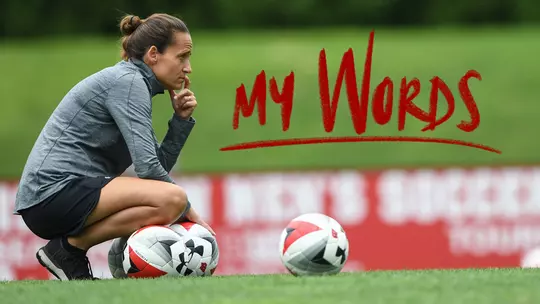
My Words: Proud to be a Title IX baby
By Paula Wilkins, Women's Soccer Head Coach
6/21/2022
I could be the poster child for Title IX.
I was born 50 years ago, exactly 21 days after Title IX went into effect in the summer of 1972, so I’ve lived my entire life on the better side of gender equality.
It would take a while for me to fully appreciate the scope of Title IX, the law that prohibits sex-based discrimination in any school or education program that receives funding from the U.S. government. But it wouldn’t take me long to capitalize on its massive power, reach and value.

When I was 7, growing up in Middletown, Pennsylvania, I decided I wanted to play soccer. I think what drew me to the game was that my cousins, all boys, played it and I was always tagging along. My parents, Richard and Sondra, didn’t fully understand why I would want to do such a thing, but they were the type that would fight for whatever I wanted. That’s how I wound up being the only girl on my first organized team.
The coach was Mike Sholtis. He was a big man in stature – he once played rugby – but he came across as this likeable, fatherly type guy. My parents approached him and asked, “If she’s good enough, will you let her play?’’
He was a little begrudging at first, but he said, “Sure, we’ll figure it out.’’ Just like that, I was 8 or 9 playing on an under-10 team. The guys called me “Winger.’’ I traveled with these boys, all from the same hometown as me. I lived in the same old-fashioned neighborhood as many of them, playing until it was dark or our parents yelled for us to come home for dinner. I played with the same guys for several years. They taught me a bunch of different things, but mostly about being competitive.
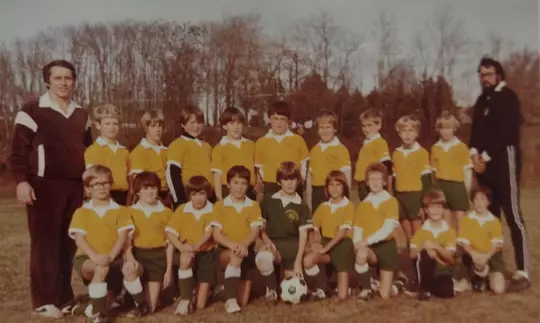
At one of first practices, I remember crying because I thought Coach Sholtis yelled at me. I was so upset because I thought I let people down.
At the time I was too young to know what was going on, but I had just embarked on one of the most important relationships I’ll ever have. Mike Sholtis influenced me in a million ways. He changed the curve of my life. He came to know me better than I knew myself. He saw strengths in me that I never knew I had. He saw my potential as a soccer player, but he also saw instincts and traits that, years later, would come to define me as a marriage partner, mother and coach of the women’s soccer team at the University of Wisconsin.
Of course, when got to high school, there was no girls’ soccer program, only one for the boys. Thankfully the coach let me try out. I made the team and started as a freshman. I had to sit in the locker room by myself when I changed in and out of my uniform. I liked the sport so much that it wasn’t weird for me. I remember sometimes sitting on the bus and feeling lonely, but I might have felt the same way with girls. I don’t know.
Looking back, I don’t know how I was able to physically handle that level of competition. I was a sophomore when I collided with a boy and broke my jaw in two places. There’s one detail from the injury I’ll never forget. I’d gone up for a header when this kid dropped his shoulder and came up underneath my jaw. I told myself, “Whatever you do, don’t cry because that would show weakness to the boys.’’
I went to the sideline with a bloody lip and told the athletic trainer that when I bit down, it didn’t feel right. “You just bit your lip,’’ he said. “You can go back in the game.’’ When my mom saw this, she came down and pulled me from the game and took me right to the dentist.
For obvious reasons, my parents became concerned about my physical well-being. I’m not sure on the specifics, but they approached officials at my school and said there needs to be an opportunity for girls to play. I don’t think they threatened a lawsuit or anything, but the school soon added girls’ soccer and started a league for high schools in the area.
That was my first official gift from Title IX.
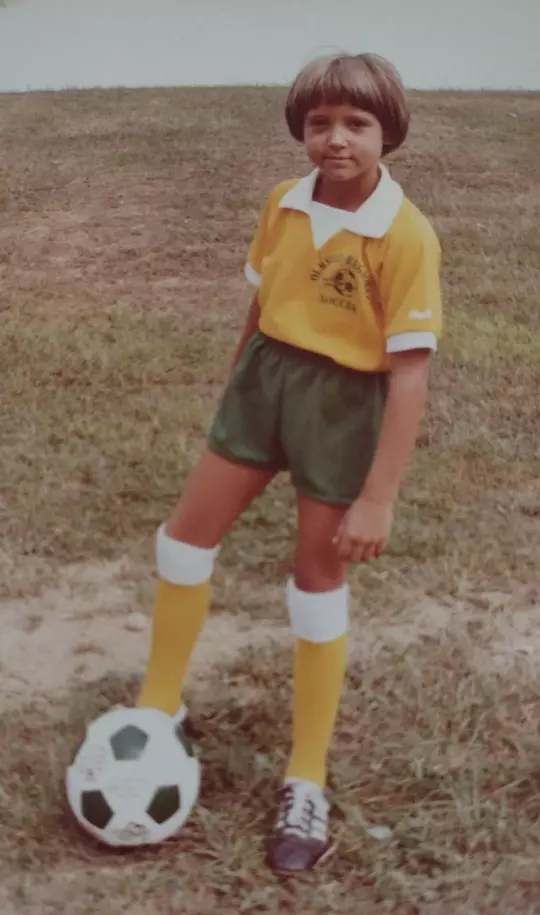
I told myself, “Whatever you do, don’t cry because that would show weakness to the boys.Paula Wilkins

The next one came when colleges large and small across the U.S. began to add and fund women’s sports. That meant access to NCAA Division I scholarships and opportunities that didn’t exist prior to Title IX.
Had I not gotten a full ride to study and play soccer at Massachusetts, I would not have been able to go to college.
Middletown was poor, mostly lower middle-class, when I was growing up. Our home was 980 square feet. My parents worked extremely hard, but were not wealthy. Dad worked for the state as a topographer, while mom worked with special needs children. My older sister, Pam, was already in school.
Another gift from Title IX came after I graduated from UMass in 1994 with a degree in exercise science. I planned on becoming a professor, but Penn State had just added a women’s soccer program and hired Pat Farmer as coach. I went to work for him as an assistant mainly to get grad school paid for – I got my master’s in physiology – but it became much more than that.
My first coaching job, as a 21-year-old right out of college, gave way to bigger and better things. I spent seven years as an assistant at Penn State, watching and helping Farmer turn the Nittany Lions into one of the elite programs in the nation.
Then came the 1999 World Cup and, suddenly, women’s soccer was an international phenomenon. Team USA hosted the most prestigious event in women’s soccer and won the title thanks in part to my former UMass teammate, goalkeeper Brianna Scurry.
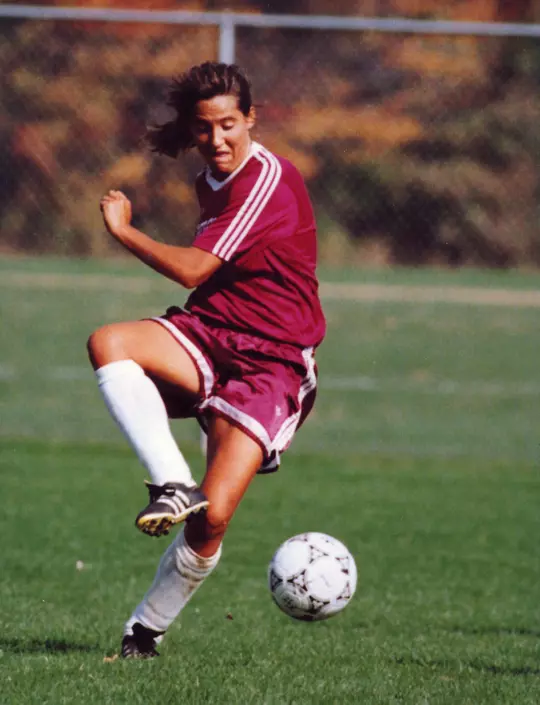
When Farmer left to coach in the Women’s United Soccer Association, a new pro league that sprang from the sudden popularity of women’s soccer, he recommended to the powers that be at Penn State that I take over the program. I wound up coaching there for six years, won the Big Ten title every season and reached the NCAA semifinals twice before deciding I wanted a new challenge. So, here I am.
Most discussions about Title IX focus on women, which I find rather curious. When I look back on my time as a player and coach, I see men stepping up and opening doors for me. It probably took some courage to invite an 8-year-old girl to play organized soccer with the boys. Same goes for letting me compete with the boys in high school. A man not only gave me my first job in coaching, he prepared me to follow in his footsteps and championed my promotion to replace him as head coach.
I’ve always wondered this: Why don’t fathers promote Title IX more on behalf of their daughters?
When I look back and reflect, I was really lucky. I’ve had a lot of father figures throughout my athletic life. My dad always had my back. Mike Soltis and Roger Menegl were two memorable youth coaches. When I played with the boys and opponents targeted me – physically and verbally – I know there were teammates who protected me. To this day, guys from those teams will show up to see the Badgers play when we’re on the road.
Most discussions about Title IX focus on women, which I find rather curious. When I look back on my time as a player and coach, I see men stepping up and opening doors for me.Paula Wilkins
I will never forget the impact Mike Soltis had on my life. A poster I made and letter I wrote in the fifth grade hung in his office until he passed away. When I graduated from high school, I got a heartfelt letter from Mike, who suggested I’d make a good teacher someday. I didn’t understand it because I had different plans. I was going to make a million dollars in the stock market. I told him that I wasn’t going to be a teacher. “OK,’’ he said.
Isn’t it funny how sometimes people know more about you than you know yourself.
I crossed paths with some incredible men who really did help me. I don’t know what motivated them. They were just good guys.
I’ve heard stories about the struggles faced by women student-athletes in the early days of Title IX at Wisconsin. Long van rides for the women’s team while the men’s team flew. Inconvenient practice schedules to accommodate the men. Locker room and training facilities that paled in comparison to the men. I’m eternally grateful for their sacrifices. I was fortunate that I never saw Title IX as a fight. I was like, “Why wouldn’t I have this opportunity?’’
One of the lessons I learned on my way to this moment is that when you grow up, you have to be someone who is someone’s hero. You have to provide opportunities and support to those on the path behind you, especially if you’re in a position of power.
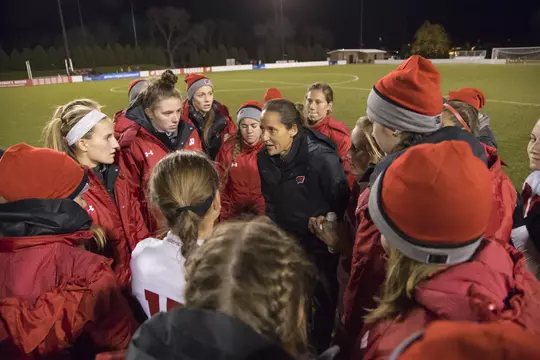
One of the lessons I learned on my way to this moment is that when you grow up, you have to be someone who is someone’s hero. You have to provide opportunities and support to those on the path behind you, especially if you’re in a position of power.Paula Wilkins
I always tell the kids on my team that life isn’t fair. Some are born with amazing parents and have wealth and direction. Some don’t.
I was blessed with people who cared. They listened. They acted. They gave me what I needed, when I needed it.
Title IX made a tremendous difference.

